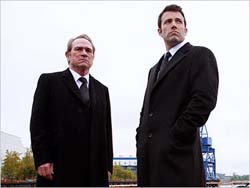September 18, 2008, starts out as normal as any other day for The Company Men’s three main characters. The hunky, 30-something breadwinner (Ben Affleck) arrives at the office in his silver Porsche, followed by his 60-year-old coworker (Chris Cooper), who has worked there for decades, and the company’s curmudgeonly old executive (Tommy Lee Jones) looks weary from the pressures of the markets falling around him. But this day proves fateful for all three of them, who find out that day that they are the latest victims of corporate downsizing.
These aren’t your average Main Street Joes—they’re upper- crust, six-figure-salary earners who make liberal use of the corporate jet. As a consequence, the story that The Company Men tells, about the hardships these three men experience once they are laid off, makes for an unusual, but successful take on the lives of unemployed Americans.
Writer-director John Wells’s main challenge with The Company Men was to make his audience feel sympathetic for guys who belong to country clubs and shuttle their children around in luxury cars. But through the drastically different reactions that the characters have to their misfortune, particularly those of the main character, Affleck’s Bobby Walker, the movie poignantly captures raw human emotion. Although Walker’s initial refusal to acknowledge his family’s money problems is frustrating, when he takes up a construction job and finds an unlikely community among the jobless contingent of his town.he makes up for having allowed his pride to hinder his resilience.

The Company Men effectively captures moments of pure tragedy, like the suicide of one man who cannot cope with his joblessness, while still subtly giving us glimpses of hope, like Walker’s heartfelt reconnection with his family during his time out of work. With this balance and range of emotion, The Company Men provides a striking, insightful commentary on the tolls of American corporate life.
While the film is no one’s idea of an uplifting Sunday matinee, it paints the kind of moving, dreary portrait of reality that many movies struggle to translate to the silver screen. Still, it is not Wells’ directing, or the stellar performances by Affleck, Jones, and Cooper, that makes this a successful film. At its heart, the film is winning because its reality is disconcertingly similar to the one in which America is living. With the fear or reality of unemployment present for so many, it is a bit like watching Jaws on a sailboat: good, yes, but a little too close for comfort.




